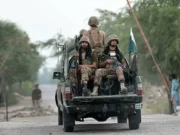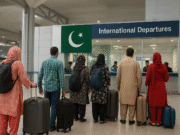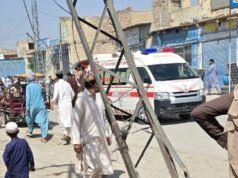QUETTA — Balochistan remains under heightened security as Pakistan’s largest province grapples with a surge in militant violence, prolonged mobile data suspension, and intensified border clashes with insurgents.
Mobile internet services across the province — including in Quetta, Kohlu, Chaman, Qila Abdullah, Pishin, Loralai, Ziarat, Qila Saifullah, Nushki, and Harnai — have been suspended for over three weeks and will remain offline until at least August 31. Provincial officials say the blackout is aimed at disrupting militant communications.
“The service has been suspended because they [militants] use it for coordination and sharing information,” said government spokesperson Shahid Rind.
The measure affects 8.5 million subscribers in the province, which is home to 15 million people. Balochistan hosts key projects under China’s $65 billion Belt and Road Initiative, including the strategic Gwadar Port.
Rising Militancy and Targeted Attacks
Separatist groups — seeking greater control over the province’s resources — have intensified attacks in recent months, targeting security forces, Chinese nationals, and senior army officers. On Tuesday, a roadside blast claimed by the Baloch Liberation Army (BLA) killed an army officer and two soldiers.
The BLA was also behind the March hijacking of the Peshawar-bound Jaffar Express in Balochistan, when militants blew up a railway track and took more than 400 passengers hostage. Thirty-one people, including 23 soldiers, were killed before security forces ended the siege, eliminating all 33 attackers.
Recent incidents include:
- Last month, a Balochistan Constabulary officer was martyred and three others injured in Mastung after gunmen attacked a police convoy.
- Two days earlier, “Indian-sponsored” militants killed Pakistan Army Major Syed Rabnawaz Tariq in Awaran.
- The same day, unidentified assailants killed three civilians and injured seven in a passenger coach attack in Kalat.
Border Clashes and Counter-Operations
On the night of August 7–8, security forces thwarted a major infiltration attempt in the Sambaza area of Zhob district near the Pakistan–Afghanistan border. According to Inter-Services Public Relations (ISPR), 33 militants — described as members of the banned Tehreek-i-Taliban Pakistan (TTP) and “Indian proxy Fitna al Khawarij” — were killed, and a large cache of arms and explosives was recovered.
ISPR vowed that Pakistani forces “remain resolute and unwavering” in defending national frontiers and eliminating “Indian-sponsored terrorism.”
Security Trends
According to the Pakistan Institute for Conflict and Security Studies (PICSS), June 2025 saw 78 militant attacks nationwide, killing at least 100 people — including 53 security personnel and 39 civilians — and injuring 189. While the figures represented an 8% drop in attacks compared to May, the violence in Balochistan remains among the deadliest, with the province accounting for a disproportionate share of nationwide casualties earlier this year.
The government has also banned road travel from Quetta to Iran and Iraq for Pakistani pilgrims due to security threats. Islamabad continues to accuse India of backing the insurgency, allegations denied by New Delhi.
With militant activity showing no sign of abating, Balochistan’s security lockdown — both on the ground and in cyberspace — is set to remain in force through the month.







































